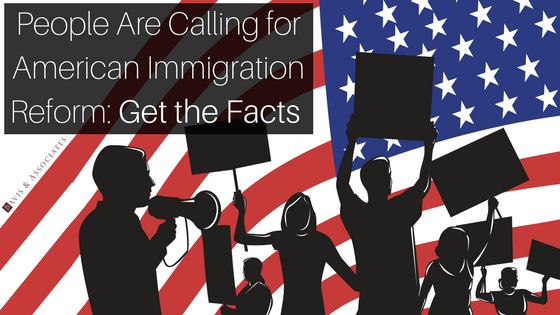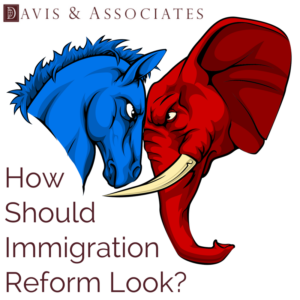
People Are Calling for American Immigration Reform: Get the Facts
Conversations regarding immigration reform did not begin with the 2016 presidential campaign, although the topic has reached a crescendo level in recent months. The Obama administration began calling attention to a need for reform as early as 2008. However, to date, there has been no legislation initiated by Congress that has achieved sufficient support.
Two Sides of Any American Immigration Reform
The challenge to enacting immigration reform today is that two factions view the situation from entirely different perspectives. One hopes to pass legislation that is more restrictive while the other side wants laws that are more receptive to immigration and residency.
Restrictive Attitudes
President Trump has been very vocal about restricting the influx of immigrants by emphasizing that often these individuals are stealing good jobs from hard-working American-born citizens and are a major contributor to the nation’s crime rate. Sympathy for this position was ignited during the 2009 recession when many Americans lost their jobs. While employment has substantially improved over the past years, the attitude toward minimizing immigration persists among many Americans and their legislative representatives.
Receptive Attitudes
Other individuals and legislators believe that the economic development and success of the United States was built by the contributions of hard working immigrants during the past four centuries. Immigrants from Latin America, Africa, and Asia, along with millions of Europeans, have arrived here and contributed to creating some of the great monuments of American industry. These monuments include the intercontinental railroad, infrastructure, and even government landmarks in Washington D.C., most notably the White House.
Immigration Reform Today
The two sides hold opposing beliefs about American immigration reform in general.
One group views immigrants as:
- Dangerous criminals
- Potential terrorists
- Stealers of high-quality jobs
- Burdens on society’s social programs
- Slowing the economy
Others see immigrants as:
- Hard-working, taking jobs that no one else wants
- Tax payers
- Homeowners (51.7% of immigrant heads of household)
- Entrepreneurs
- Consumers
- Keeping the economy growing (especially as the Baby Boom generation retires)
Since there has been some validation to both sets of beliefs, immigration reform will likely be a complicated problem to resolve.
The most tangible symbol of oncoming American immigration reform attitudes today is the debate over the current president’s campaign promise of a high wall across the nearly 2,000-mile border between the United States and Mexico. While the proposed wall is still being debated and is, as yet, unfunded, the controversy brings some clarity to the current administration’s commitment to reducing immigration.
Also, new legislation supporting tougher immigration enforcement is appearing in several states, notably Texas, where deportation will likely increase.
How Should American Immigration Reform Look?
American Immigration Reform means different things to different people.
To former President Obama, after some failed attempts at immigration legislation, immigration reform resulted in executive action that would, according to a November 2014 USA Today article:
- Defer deportation of 4.3 million undocumented immigrants.
- Legalize the presence of about 700,000 “Dreamers” who arrived as children before 2010 and remain as adults.
- Focus ICE (Immigrations and Customs Enforcement) efforts on prioritizing the deportation of individuals who are convicted felons, threats to national security, and those who may have recently entered illegally.
- Streamline the visa process for high net worth investors or qualified students coming to the United States to study technology and science.
Under President Trump, no concrete immigration reform has been formalized. Indications are that any plan he supports would be highly restrictive, touting the safety and protection of quality jobs for Americans. In January of 2017, the president issued an executive order that restricted travel of individuals from seven mostly Muslim countries while halting all immigration for a period to review security procedures. While U.S. Courts have largely diluted the original order, an attitude toward restrictive immigration is evident.
According to a New York Times article from August 2017, the president supports a measure that cuts U.S. immigration by 50% by restricting the ability of U.S. citizens and legal residents (green card holders) from bringing in members of their family. Denying the entry of spouses and children would, some critics say, cause many skilled, tax paying workers to leave.
Recent or long-standing immigrants should consult a qualified immigration law firm to understand their rights in the current changing environment. Stay abreast of current immigration news by visiting Davis & Associates ongoing news and blogs that may pertain to your personal situation.
Contact Davis & Associates Immigration Lawyers
In Dallas and North Texas, contact Davis & Associates for a free consultation to discuss your situation and American immigration reform in detail. Immigration enforcement and legislation in Texas are changing, and your rights may be threatened. Davis & Associates’ multi-lingual staff stays current with all activities surrounding American immigration reform, visas, residency, and citizenship.
Phone for a free consultation in Dallas at 214.628.9888.
About Davis & Associates:
Davis & Associates is the immigration law firm of choice in North Texas including Dallas, Fort Worth, Plano, Frisco, McKinney and surrounding areas. Their attorneys provide expert legal counsel for all aspects of immigration law, including deportation defense, writs of habeas corpus and mandamus, family-sponsored immigration, employment-sponsored immigration, investment immigration, employer compliance, temporary visas for work and college, permanent residence, naturalization, consular visa processing, waivers, and appeals. Attorney Garry L. Davis is Board Certified in Immigration and Nationality Law by the Texas Board of Legal Specialization.
